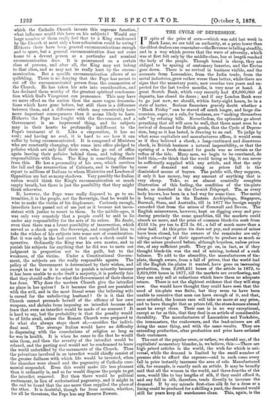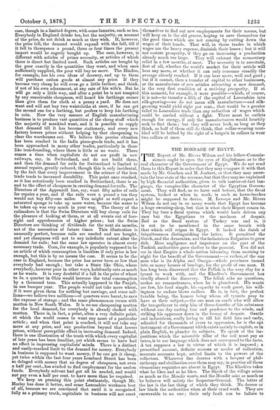THE CYCLE OF DEPRESSION.
large number of them really feel that to a King condemned TN spite of the price of corn—which was sold last week in by the Church at most only a bare submission could be owing ? 1 Mark Lane, we are told on authority, at a price lower than Hitherto there have been general excommunications enough the oldest dealers can remember—the Revenue is falling steadily, munication. But a specific excommunication allows of no accounts from Lancashire, from the India trade, from the quibbling. There is no denying that the Pope has meant to metal industries, grow rather worse than better, while there are cut off the excommunicated person from the communion of signs that the monetary panic, now overdue two years and ex- the Church. He has taken his acts into consideration, and petted for the last twelve months, is very near at hand. A has declared them worthy of the greatest spiritual condemna- great Scotch Bank, which very recently had £8,000,000 of tion which God's Vicegerent can pronounce. This may have deposits, has closed its doors ; and if any London Bank were no more effect on the nation than the more vague denancia- to go just now, we should, within forty-eight hours, be in a tions which have gone before, but still there is a difference state of barter. Serious financiers gravely doubt whether a between them, and a difference which may conceivably have "Black Friday" can be staved off much longer, and large dis- more important consequences than it seems likely to have. counters, eager, as a rule, for business, are "making themselves Hitherto the Pope has fought with the Government, and a safe " by refusing bills. Nevertheless, the optimists go about 'Government is an impersonal thing, and its subjects preaching that all will soon be well, that there must soon be a may in their hearts be profoundly indifferent to the revival of demand for British goods, that the Cycle of Depres- Pope's treatment of it. Like a corporation, it has no sion, long as it has lasted, is drawing to an end. To judge by soul; and having no soul, it is hard to see how it can what some capitalists and manufacturers affirm, it would seem suffer by being excommunicated. It is composed of Ministers as if they believed a check, a long-continued and disastrous who are constantly changing, who come into office pledged to check, in British business a natural impossibility, or that the policies which are only half their own, who go out of office uprising of a fresh demand for goods was as certain as the again leaving their policies behind. them, and taking their reflux of the tide. Many men, we begin to be convinced, do responsibilities with them. The King is something different hold this,—do think that the world being so big, it can never from this. He has a personality of his own, which survives be sufficiently supplied with any article, and that the only the fall and the resurrection of Cabinets, and is familiar by cause of demand not rising as prices fall is the report to millions of Italians to whom Ministries and Leaders of diminished means of buyers. The public will, they suppose, Opposition are but so many shadows. Very possibly the Italian if only it has money, buy any amount of anything that is nation would think the King's excommunication so much very cheap. Take, as an almost comically complete empty breath, but there is just the possibility that they might illustration of this feeling, the condition of the tin-plate think otherwise. trade, as described in the Cornish Telegraph. Tin, as every case, though in a limited degree, with some luxuries, such as tea. Everybody in England drinks tea, but the majority, on account of the price, do not drink as much as they wish. If, however, the price fell, the demand would expand with the fall, till if it fell to threepence a pound, three or four times the present import would be eagerly bought up. The case, however, is different with articles of prime necessity, or articles of which there is direct but limited need. Such articles are bought by the poor exactly in the quantities they want, and when once sufficiently supplied, the poor will buy no more. The Hindoo, for example, has his own ideas of decency, and up to them will purchase cotton goods at almost any price. If they become very cheap he will even go a little farther, and think, if not of his own adornment, at any rate of his wife's. But he will go only a little way, and after a point he is not tempted by any conceivable cheapness, will hoard his farthings sooner than give them for cloth at a penny a yard. He does not want and will not buy two waistcloths at once, if he can get the second one for a farthing, but prefers to keep his farthing in coin. Now the very essence of English manufacturing business is to produce vast quantities of the cheap stuff which the majority of mankind want, and it is possible to supply that demand till it has become stationary, and every new factory lowers prices without helping by that cheapening to clear the warehouses out. We believe this precise situation has been reached in the India piece-goods trade, and it has been approached in many other trades, particularly in those like iron-founding, where there is little or no waste. There comes a time when capitalists do not see profit in new railways, say, in Switzerland, and do not build them, and then the demand for rails for Switzerland is limited to annual repairs, greatly reduced, though this is only incidental, by the fact that every improvement in the science of the iron trade tends to increased durability. This point once reached, as it has notoriously been reached in Switzerland, there is an end to the effect of cheapness in creating demand for rails. The Directors of the Appenzell line, say, want fifty miles of rails for repairs a year, and if the rails were a pound a ton they would not buy fifty-one miles. You might as well expect a saturated sponge to take up more water, because the water to be taken up was very much in your way. The theory of the railmakers is that the Swiss Directors will buy cheap rails for the pleasure of looking at them, or at all events out of fore- sight and apprehension of higher prices ; but the Swiss Directors are thinking of dividends for the next six months, not of the necessities of future times. This illustration is unusually perfect, because rails are needed and are bought, and yet cheapness will not to any indefinite extent alter the demand for rails; but the same law operates in almost every necessary trade. Corn, for example, is popularly supposed to be an article of which consumption is limitless if only price is low enough, but this is by no means the case. It seems to be the case in England, because the price has never been so low that everybody had enough ; but take a State like Ohio, where everybody, however poor in other ways, habitually eats as much as he wants. It is very doubtful if a fall in the price of wheat to 5s. a quarter in Ohio would increase the total consumption by a thousand tons. This actually happened in the Punjab, in one bumper year. The people would not take more wheat, if it were given them for nothing but carriage, and some mil- lions—we believe two millions—of quarters were burnt, to save the expense of storage ; and the same phenomenon recurs with mutton in New South Wales. It is no use cheapening mutton for the local demand, for everybody is already choked with mutton. There is, in fact, a point, often a very definite point, at which the world ceases to want any more of a particular article ; and when that point is reached, it will not take any more at any price, and any production beyond that lowers prices, without perceptible effect in increasing demand. Indeed, there is one illustration of the truth with which every capitalist of late years has been familiar, yet which seems to have had no effect in impressing capitalists' minds. There is a distinct and easily-reached limit to the demand for money. Everybody in business is supposed to want money, if he can get it cheap, yet twice within the last four years Lombard Street has been so deluged with money that no degree of cheapness, not even a half per cent., has availed to find employment for the useless funds. Everybody solvent had got all he needed, and would not pay even a half per cent. to have more than he required. We keep on pressing this point obstinately, though Mr. Morley has done it better, and some Lancashire workmen best of all, because we are convinced that until it is recognised fully as a primary truth, capitalists in business will not exert themselves to find out new employments for their means, but will keep on in the old groove, hoping to save themselves for the good times which are not coming by cutting down the wages of their hands. That will, in those trades in which wages are the heavy expense, diminish their losses ; but it will not restore prosperity, if they go on increasing a production already much too large. They will exhaust the momentary relief in a few months, at most. The necessity is to ascertain, first of all, whether the world's market for their article will bear any more, or whether it can only consume steadily the average already reached. If it can bear more, well and good ; but if it cannot, then a transfer of capital to other businesses, or the manufacture of new articles attracting a new demand, is the very first condition of a reviving prosperity. If at this moment, for example, it were possible—which, of course, it is not—to transfer a fifth of the capital of Lancashire into silk-growing—we do not mean silk manufacture—and silk- growing would yield eight per cent., that would be a greater relief to Lancashire trade than any reduction of wages which could be carried without a fight. There must be outlets enough for energy, if only the manufacturers would heartily seek to find them ; but they will never look, so long as they think, as half of them still do think, that collar-wearing man- kind will be bribed by the sight of a bargain in collars to wear two collars at once.



































 Previous page
Previous page